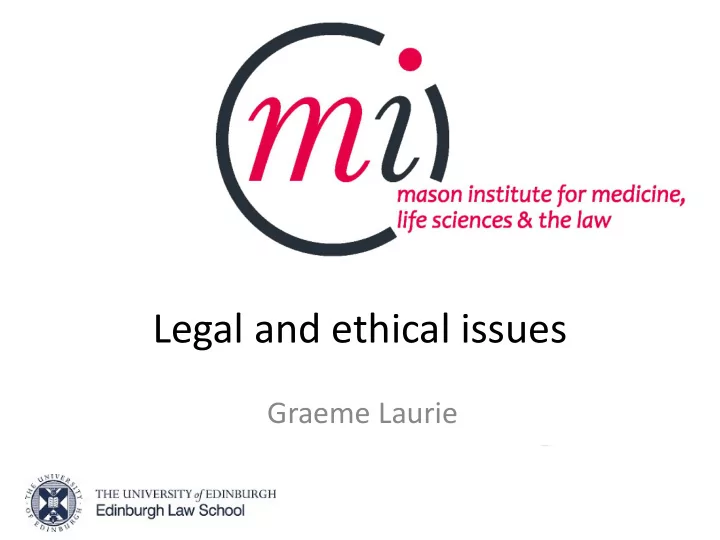

Legal and ethical issues Graeme Laurie
The remit • “… creating , curating , and using brain image banks, including research uses ” • The importance of relationships, compare: • Health care professional/patient • Researcher/participant • Data custodian/data subject • Duties, rights and expectations
Creating • Consent: valid as to informedness, voluntariness, and capacity • Broad consent: “…to participate in research” • Capacity: cf ‘benefits’ v ‘best interests” • Social licence and public engagement
Creating, capacity and research • Mental Capacity Act 2005 and Adults with Incapacity (Scotland) Act 2000: - Potential for real and direct benefit - No comparative effectiveness with consent - Informed on rights and does not object - Necessary authorisation (proxy or committee) - Prior wishes respected
Curating in the public interest • Royal Society, Science as an Open Enterprise , (2012) • “Intelligent Openness” – Intelligibility – Verifiability – Accessibility • Two caveats: (i) commercial confidence, and (ii) personal privacy
Curating in the private interest • Data Protection Act 1998 and common law duty of confidence • Key responsibility is “data controller” • “processing” of “personal data” – identifiability is key (now or in the future) • Consent or anonymise paradigm • ICO’s Code on Anonymisation (2012): “motivated intruder” • “ Authorisation ”: PAC ( Sc) and CAG (Eng & Wales)
Using in the public interest • Care Act 2014: Health Research Authority has duties to protect and promote ethical research • The importance of good governance of access • Transparency, accountability, and engagement • Proportionate risk-based governance
Using in the private interest • Incidental Findings: Is there a duty to disclose? • Ethical or legal question? • Clinical utility, nature and magnitude of threat • Duty of Care: – dr/patient or researcher/participant? – a reasonable standard of care (relative to profession) – Breach of duty was cause of the harm
Consensus statement • The role (and the limits) of consent in creating • Broad consent + good proportionate governance • Intelligence Openness for responsible curating • Protection and promotion when using • Professional role in setting and policing standards of care
Recommend
More recommend